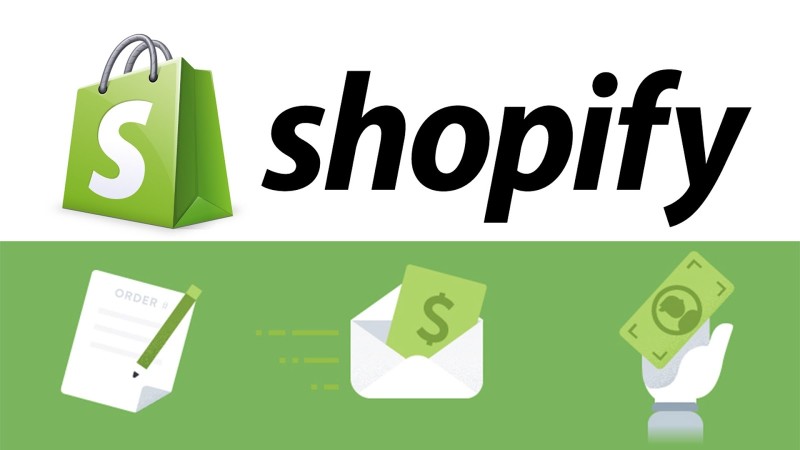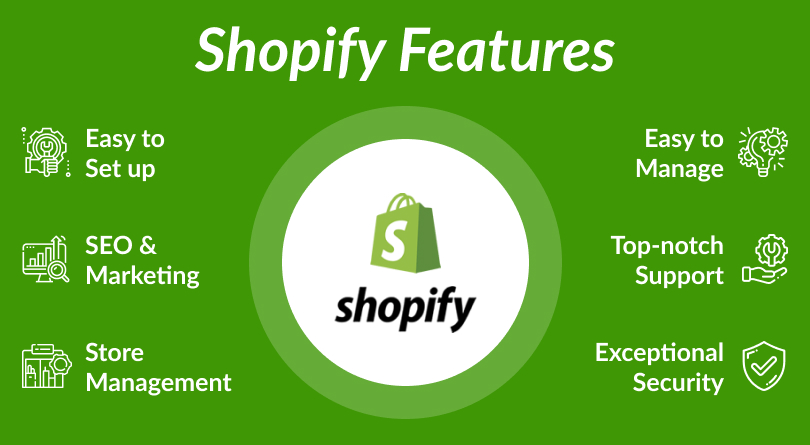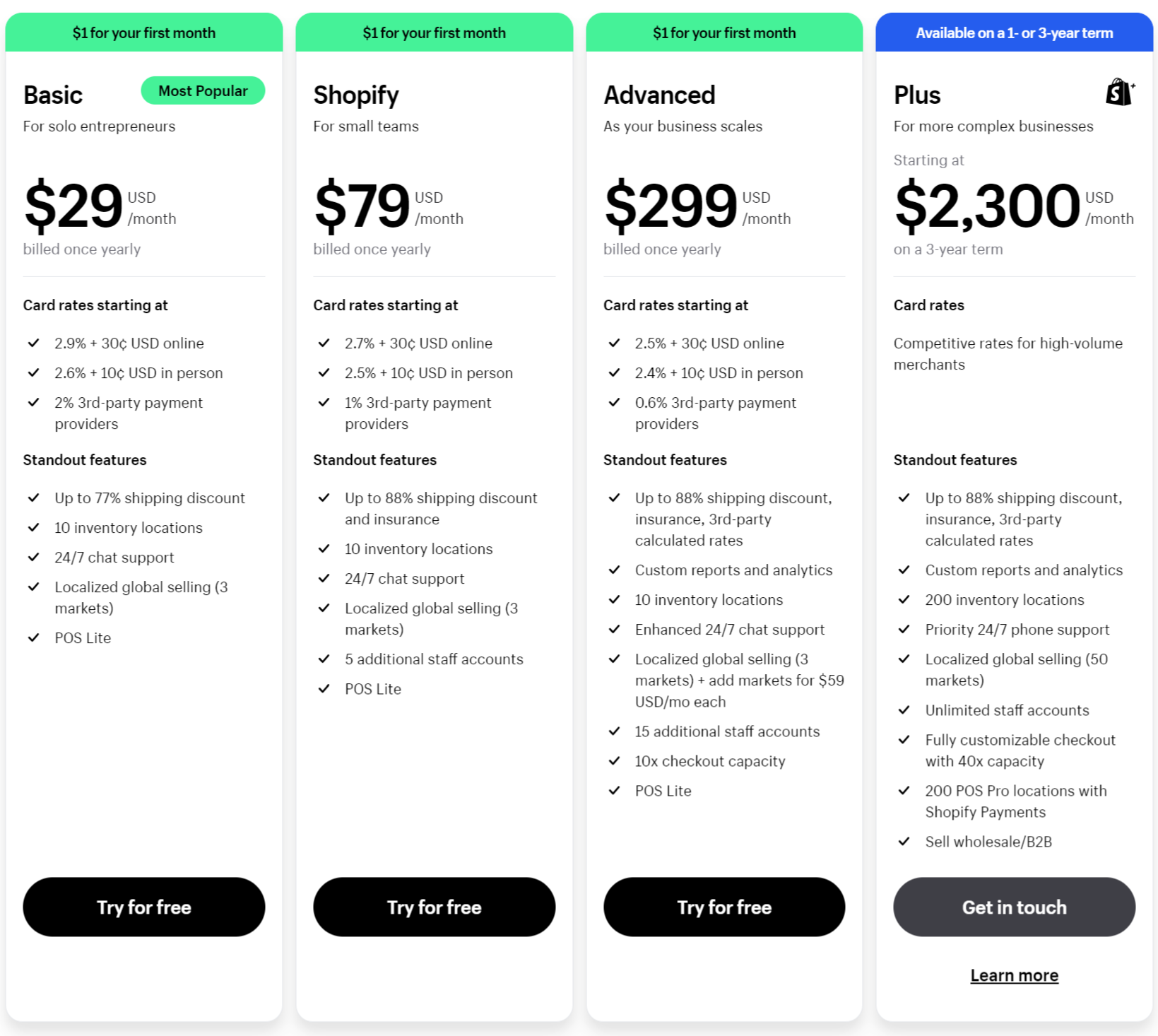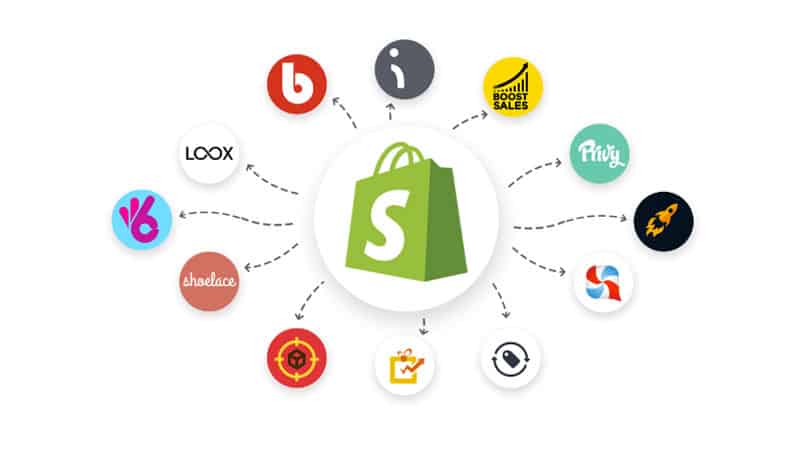
Shopify Review: The Best Builder for Online Stores
What is Shopify?
Shopify is a leading e-commerce platform that enables businesses to create and manage online stores. Founded in 2006, it has evolved into a comprehensive solution for entrepreneurs seeking to establish an online presence and sell products or services. Shopify offers a user-friendly interface and a suite of tools that empower users to build customizable storefronts without the need for extensive technical knowledge.
With Shopify, businesses can design their websites, manage inventory, process payments securely, and track orders seamlessly from a centralized dashboard. The platform provides a variety of customizable templates and themes, allowing businesses to create unique and professional-looking online stores that reflect their brand identity.
Shopify offers a wide range of features and services, including secure payment processing, built-in marketing tools, and integration with third-party apps, to help businesses grow and succeed in the competitive e-commerce landscape. Shopify simplifies the process of starting and scaling an online business, making it a popular choice among entrepreneurs worldwide.
How Does Shopify Work?
Shopify simplifies the process of creating and managing online stores for businesses of all sizes. Users start by signing up for a Shopify account and selecting a subscription plan. Once registered, they gain access to a user-friendly dashboard where they can customize their storefront’s design using a wide array of templates and themes.
Adding products to the store is intuitive, with users able to upload product details like images, descriptions, prices, and inventory levels. Shopify also supports the management of product variants, such as sizes and colors, streamlining the process for businesses with diverse product offerings.
For seamless transactions, Shopify integrates with multiple payment gateways, enabling users to accept payments securely through credit cards, PayPal, and other methods. When customers make purchases, Shopify automatically processes orders, adjusts inventory levels, and sends order notifications to the user.
Shopify offers built-in marketing tools to help users attract customers and boost sales. From search engine optimization (SEO) to email marketing campaigns and discount code creation, Shopify provides various features to drive traffic and conversions to the online store.
The platform includes robust analytics and reporting capabilities, allowing users to track sales performance, monitor website traffic, and gain insights into customer behavior. These analytics empower users to make informed decisions to optimize their store’s performance and grow their business.
Shopify provides reliable customer support through email, phone, and live chat, ensuring users receive assistance whenever they encounter challenges or have questions about using the platform. Shopify’s intuitive interface, extensive features, and reliable support make it a powerful tool for businesses looking to establish and grow their online presence.
Shopify Features
Shopify encompasses a myriad of features designed to empower businesses in creating, managing, and scaling their online stores seamlessly. Users benefit from customizable website templates and themes, enabling them to craft visually appealing storefronts tailored to their brand’s aesthetic. Beyond aesthetics, Shopify equips users with robust tools for managing product listings, inventory, and order fulfillment, streamlining the entire sales process.
Payment processing is simplified through Shopify’s integration with various payment gateways, ensuring secure transactions globally. The platform offers an array of marketing tools, including SEO optimization, email marketing, and social media integration, enabling businesses to attract and engage customers effectively.
Shopify provides extensive analytics and reporting capabilities, allowing users to track sales performance, monitor website traffic, and gain insights into customer behavior. Armed with actionable data, businesses can make informed decisions to optimize their store’s performance and drive growth.
Shopify offers a suite of supplementary features and services, encompassing built-in shipping and fulfillment solutions, customer support tools, and access to a vast ecosystem of third-party apps and integrations. Collectively, these features empower businesses to thrive in the competitive landscape of e-commerce, delivering unparalleled value and functionality to users worldwide.
Shopify pricing
Shopify offers a range of pricing plans to accommodate businesses of all sizes and budgets. The platform’s pricing structure is designed to provide flexibility and scalability, ensuring that users can select a plan that best suits their needs.
At the entry level, Shopify Lite offers a budget-friendly option starting at $9 per month. This plan allows users to sell products on existing websites or social media platforms using Shopify’s “Buy” button feature. While it doesn’t include a standalone online store, it provides essential features for businesses just starting out.
For businesses seeking a full-fledged online store, the Shopify Basic plan starts at $29 per month. This plan includes all the essentials for launching and managing an online store, such as website customization, unlimited products, and 24/7 customer support. The Shopify plan, starting at $79 per month, offers additional features and capabilities tailored for growing businesses. These include professional reports, abandoned cart recovery, and the ability to offer gift cards to customers.
For high-volume businesses with more complex needs, the Advanced Shopify plan is available starting at $299 per month. This plan provides advanced features such as real-time carrier shipping rates, custom reporting, and additional staff accounts. Shopify offers Shopify Plus, an enterprise-level solution designed for large businesses and corporations. Pricing for Shopify Plus is customized based on the specific requirements and scale of each business.
How to Get Started With Shopify
To begin your journey with Shopify, the first step is to sign up for an account on their website. Simply navigate to the Shopify homepage and click on the “Get Started” button. You’ll then be prompted to enter some basic information about your business, such as your email address, desired store name, and password.
Once your account is created, Shopify will guide you through the process of setting up your online store. This involves selecting a customizable template or theme for your storefront, adding your products, and configuring your store settings. Shopify offers a user-friendly interface and intuitive tools to help you design and personalize your store to match your brand’s identity.
After you’ve set up your store and added your products, the next step is to choose a pricing plan. Shopify provides a variety of plans with different features and pricing options, allowing you to select the one that best fits your business needs and budget.
Once you’ve chosen a plan and completed the setup process, you can launch your online store and start selling to customers around the world. Shopify offers built-in tools for managing orders, processing payments, and tracking sales, making it easy to run and grow your online business effectively.
Benefits of Using Shopify
Shopify offers a plethora of advantages that cater to businesses of all sizes and industries. Firstly, its user-friendly interface and intuitive tools simplify the process of setting up and managing an online store, making it accessible even to those with limited technical expertise.
Secondly, Shopify provides a wide array of customizable templates and themes, allowing businesses to create visually appealing and unique storefronts that reflect their brand identity. This level of customization extends to product management, payment processing, and shipping options, enabling businesses to tailor their online stores to their specific requirements.
Moreover, Shopify’s extensive ecosystem of apps and integrations offers users access to a wealth of additional features and functionality to enhance their online stores. From marketing tools and analytics to customer support and inventory management solutions, Shopify’s app store provides endless possibilities for customization and optimization.
Furthermore, Shopify offers reliable hosting and security features, ensuring that users’ online stores are fast, secure, and always available to customers. With built-in SSL encryption, automatic backups, and 24/7 customer support, Shopify provides peace of mind for businesses seeking a robust and reliable e-commerce solution.
The benefits of using Shopify encompass ease of use, customization options, access to a vast ecosystem of apps, reliable hosting and security features, and ongoing support to help businesses thrive in the competitive online marketplace.
Is Shopify Easy to Use?
Yes, Shopify is renowned for its user-friendly interface and intuitive design, making it easy for users of all skill levels to create and manage their online stores. The platform offers a simple and straightforward setup process, guiding users through each step from selecting a template to launching their store.
One of Shopify’s key features is its drag-and-drop editor, which allows users to customize their storefronts without any coding knowledge. This enables users to create professional-looking websites with ease, adjusting layouts, colors, and fonts to match their brand identity.
Additionally, Shopify provides extensive documentation, tutorials, and customer support to assist users at every stage of the process. Whether users have questions about setting up their store, managing products, or configuring payment options, Shopify offers resources to help them navigate the platform effectively.
Furthermore, Shopify’s dashboard provides easy access to all essential features and tools, allowing users to manage their store, track sales, and analyze performance effortlessly. With its user-friendly interface and robust functionality, Shopify empowers businesses to create and grow their online presence without the complexity typically associated with e-commerce platforms.
Shopify Customer Service
Shopify prioritizes exceptional customer service, offering users access to various support channels to address their queries and concerns promptly. The Shopify Help Center is a comprehensive resource hub featuring extensive documentation, tutorials, and guides covering a wide range of topics related to setting up and managing an online store. Users can find answers to common questions and troubleshoot issues independently using this valuable resource.
In addition to self-service options, Shopify provides personalized assistance through email, phone, and live chat support. Their support team consists of knowledgeable agents who are responsive and dedicated to resolving users’ inquiries efficiently. Whether users require technical assistance, guidance on customization, or help with billing and account management, Shopify’s customer service team is committed to delivering timely and effective solutions.
Furthermore, Shopify offers 24/7 customer support across all pricing plans, ensuring that users receive assistance whenever they need it. This commitment to customer satisfaction underscores Shopify’s dedication to providing a seamless and positive experience for users as they navigate the platform and grow their online businesses.
Shopify Integrations
Shopify offers a robust ecosystem of integrations with third-party apps and services, enriching the functionality and versatility of users’ online stores. These integrations span across various aspects of e-commerce, including marketing, customer service, inventory management, shipping, and more.
By leveraging Shopify’s integrations, users can streamline and automate various tasks, enhancing efficiency and productivity. For instance, integrating with email marketing tools such as Mailchimp or Klaviyo enables users to create and deploy targeted email campaigns to engage with their customer base effectively. Likewise, integrating customer service platforms like Zendesk or Gorgias facilitates seamless communication and support for customers.
Moreover, Shopify integrates seamlessly with accounting software such as QuickBooks and Xero, facilitating the synchronization of sales data and simplifying financial management processes. Inventory management integrations like Stocky or TradeGecko empower users to monitor and control inventory levels efficiently.
Shopify’s integrations with shipping and fulfillment services, such as ShipStation, Shippo, and Easyship, enable users to streamline order fulfillment, generate shipping labels, and manage shipments effortlessly. Shopify’s extensive range of integrations empowers users to customize and optimize their online stores according to their specific requirements, ultimately driving growth and success in the e-commerce landscape.
Shopify Pros and Cons
Shopify offers numerous advantages that make it a leading choice for businesses seeking to establish and expand their online presence. Firstly, it boasts a user-friendly interface and intuitive tools, simplifying the process of setting up and managing an online store. Its drag-and-drop editor enables easy customization of storefronts, allowing users to create professional-looking websites without the need for extensive coding knowledge.
Secondly, Shopify provides a vast selection of customizable templates and themes, enabling businesses to create visually appealing and unique storefronts that align with their brand identity. This level of customization extends to product management, payment processing, and shipping options, empowering businesses to tailor their online stores to their specific requirements.
Additionally, Shopify offers comprehensive customer support, including extensive documentation, tutorials, and responsive assistance via email, phone, and live chat. This ensures that users receive the help they need at every stage of their e-commerce journey.
However, Shopify also has some limitations. One potential drawback is the cost, as Shopify’s pricing plans may be higher compared to some other e-commerce platforms. Additionally, while Shopify offers a wide range of features, some advanced functionalities may require additional apps or custom development. Shopify’s pros, including its user-friendly interface, customization options, and comprehensive support, outweigh its cons, making it a popular and effective choice for businesses looking to thrive in the online marketplace.
Conclusion of Shopify
In conclusion, Shopify emerges as a leading solution for businesses seeking to establish and expand their online presence. Its user-friendly interface, coupled with a vast array of customization options, enables businesses to create visually appealing and functional online stores that align with their brand identity. The platform’s intuitive design simplifies the setup and management process, making it accessible to users of all skill levels. Additionally, Shopify’s robust ecosystem of integrations provides users with access to a wide range of additional features and functionalities, allowing them to tailor their online stores to their specific needs and preferences.
Furthermore, Shopify’s commitment to customer support ensures that users receive prompt and helpful assistance whenever needed. Whether through comprehensive documentation, tutorials, or responsive support channels, Shopify empowers users to overcome challenges and maximize their e-commerce potential.
While Shopify may have some limitations, such as pricing considerations and the need for additional apps for certain advanced features, its overall strengths far outweigh its drawbacks. With its combination of usability, customization options, and support services, Shopify remains a top choice for businesses looking to thrive in the competitive online marketplace.
FAQs Shopify
What is Shopify?
Shopify is a leading e-commerce platform that enables individuals and businesses to create and manage online stores. It provides a range of tools and features to help users build, customize, and operate their online businesses, including website design, product management, payment processing, and order fulfillment.
How does Shopify work?
Shopify works by offering users a user-friendly interface and a suite of customizable templates and themes to create their online stores. Users can add products, set up payment gateways, and configure shipping options through Shopify’s dashboard. Additionally, Shopify integrates with various third-party apps and services to enhance store functionality.
Is Shopify suitable for beginners?
Yes, Shopify is known for its ease of use, making it suitable for beginners with little to no technical expertise. Its intuitive interface and step-by-step setup process guide users through creating and managing their online stores. Additionally, Shopify offers extensive documentation and customer support to assist users at every stage.
What are the pricing plans for Shopify?
Shopify offers a range of pricing plans to accommodate businesses of all sizes and budgets. These plans include Basic Shopify, Shopify, and Advanced Shopify, each with varying features and pricing tiers. Additionally, Shopify offers a 14-day free trial for users to test the platform before committing to a plan.
Can I customize my Shopify store?
Yes, Shopify allows for extensive customization of online stores. Users can choose from a variety of customizable templates and themes and use Shopify’s drag-and-drop editor to customize their storefronts’ appearance and layout. Additionally, Shopify offers access to HTML, CSS, and JavaScript for further customization.
Does Shopify provide customer support?
Yes, Shopify offers comprehensive customer support to assist users with any questions or issues they may encounter. This includes email, phone, and live chat support, as well as a help center with documentation, tutorials, and guides. Additionally, Shopify has a thriving community forum where users can seek advice and assistance from fellow merchants.
How does Shopify handle payments?
Shopify offers its built-in payment gateway called Shopify Payments, allowing users to accept credit card payments directly through their online stores. Additionally, Shopify integrates with over 100 third-party payment gateways, giving users flexibility in accepting payments from customers worldwide.
Can I sell on Shopify if I’m not based in the United States?
Yes, Shopify is available to users in over 175 countries worldwide. It supports multiple currencies and languages, allowing businesses to sell globally. Additionally, Shopify offers localized payment options and shipping integrations to facilitate international sales.
Does Shopify offer marketing features?
Yes, Shopify provides a range of marketing features to help businesses attract and retain customers. This includes built-in SEO tools, email marketing integrations, social media integration, and more. Additionally, Shopify offers analytics tools to track sales and customer behavior.
Can I sell both physical and digital products on Shopify?
Yes, Shopify supports the sale of both physical and digital products. Users can easily add products to their online stores, set prices, manage inventory, and fulfill orders for both types of products. Shopify also offers features such as product variants and digital downloads to accommodate different types of products.



